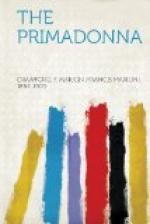‘Shall you tell him about the drop of blood on your hand?’
’Without the slightest hesitation. But not until I am asked, and I shall be very glad if you will not speak of it.’
‘I won’t,’ Margaret said; ’but I wonder why you have told me if you mean to keep it a secret!’
The veteran man of letters turned his sad grey eyes to hers, while his lips smiled.
‘The world is not all bad,’ he said. ’All men are not liars, and all women do not betray confidence.’
‘It’s very good to hear a man like you say that,’ Margaret answered. ‘It means something.’
‘Yes,’ assented Griggs thoughtfully. ’It means a great deal to me to be sure of it, now that most of my life is lived.’
‘Were you unhappy when you were young?’
She asked the question as a woman sometimes does who feels herself strongly drawn to a man much older than she. Griggs did not answer at once, and when he spoke his voice was unusually grave, and his eyes looked far away.
‘A great misfortune happened to me,’ he said. ‘A great misfortune,’ he repeated slowly, after a pause, and his tone and look told Margaret how great that calamity had been better than a score of big words.
‘Forgive me,’ Margaret said softly; ‘I should have known.’
‘No,’ Griggs answered after a moment. ’You could not have known. It happened very long ago, perhaps ten years before you were born.’
Again he turned his sad grey eyes to hers, but no smile lingered now about the rather stern mouth. The two looked at each other quietly for five or six seconds, and that may seem a long time. When Margaret turned away from the elderly man’s more enduring gaze, both felt that there was a bond of sympathy between them which neither had quite acknowledged till then. There was silence after that, and Margaret looked out of the window, while her hand unconsciously played with the book on her knee, lifting the cover a little and letting it fall again and again.
Suddenly she turned to Griggs once more and held the book out to him with a smile.
‘I’m not an autograph-hunter,’ she said, ’but will you write something on the fly-leaf? Just a word or two, without your name, if you like. Do you think I’m very sentimental?’
She smiled again, and he took the book from her and produced a pencil.
‘It’s a book I shall not throw away,’ she went on, ’because the man who wrote it is a great friend of mine, and I have everything he has ever written. So, as I shall keep it, I want it to remind me that you and I grew to know each other better on this voyage.’
It occurred to the veteran that while this was complimentary to himself it was not altogether promising for Lushington, who was the old friend in question. A woman who loves a man does not usually ask another to write a line in that man’s book. Griggs set the point of the pencil on the fly-leaf as if he were going to write; but then he hesitated, looked up, glanced at Margaret, and at last leaned back in the seat, as if in deep thought.




